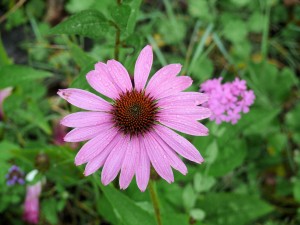Echinacea is a medicinal herb, native to North America. Many of you might have seen this plant, with daisy like flowers, without even recognizing it. Echinacea is a widely used medicinal plant throughout the world and it is thought to be an immune enhancing herb that fights infections. Researchers have concluded that Echinacea works effectively to reduce cold and flu symptoms.
Health benefits of Echinacea:
Echinacea is commonly used by Native Americans as a medicinal herb. The plant has many infection fighting traits. Besides boosting the immune system and fighting cold and flu symptoms, it also fights against many other infections including bloodstream infections like (septicemia), urinary tract infections, tonsillitis, vaginal yeast infections, syphilis, gum disease, genital herpes, malaria, streptococcus infections, diphtheria and typhoid.
“Echinacea Root supports the lower urinary tract. Echinacea is used for healthy immune system support as well as healthy sinus function. It has also been shown to support healthy respiratory function; used externally for minor wounds.” – Healing Elements | Echinacea
It has also been found that the health benefits of Echinacea are not limited to just infections, but it’s also beneficial against non-infectious diseases such as chronic fatigue syndrome (CFS), migraines rheumatism, acid indigestion, dizziness, pain, rattlesnake bites, and attention deficit-hyperactivity disorder (ADHD).
How it works?
While researching Echinacea, scientists have found that it has a complex mix of antimicrobial chemicals and a compound called phenol. There is also evidence found that it stimulates our body’s natural defense mechanism or immune system with its antioxidants. Its anti-inflammatory properties are effective in reducing the cold and flu symptoms, and it’s anti-fungal and antiseptic chemicals fights yeast and fungi directly.
Does it Really work?
 There is some controversy and echinacea has its opponents. Although it’s one of the most common and popular herbs in western herbal medicine, it has often been criticized and has been the subject of controversy and misunderstanding.
There is some controversy and echinacea has its opponents. Although it’s one of the most common and popular herbs in western herbal medicine, it has often been criticized and has been the subject of controversy and misunderstanding.
David Bunting wrote in an article named Echinacea Myths, Controversy and Facts that “Surprisingly, one of the most popular and common remedies in western herbalism has been the subject of controversy and misunderstanding for over 100 years. Historically, much of the original controversy started with highly exaggerated claims for Echinacea’s benefits, fueled by an ongoing feud between different schools of medicine. More recently, misinterpretations of scientific studies and disregard for traditional use have clouded the true nature and application of Echinacea. ”
Despite the controversies and criticism, this vital herb has always been a popular herb among herbal practitioners and dispensaries across North America.
Is it safe?
Generally speaking, it’s safe and has no known severe side effects. However, a natural supplement does not always mean harmless. It’s important to remember that natural means it occurs in nature, and does not contain any man-made synthetic chemicals. Herbs can be very powerful and natural doesn’t always mean that detrimental effects are impossible, if taken in the wrong way. These medicinal herbs should be taken only if necessary and used only as recommended by your vendor.
Echinacea is possibly safe for adults or children when used for short term, but there isn’t enough information available on its long term use. Some have reported nausea, vomiting, and fever, and some also have reported allergic reaction to the plant when applied on the skin, so always practice caution and consult a doctor or specialist before using. Pregnant and nursing mothers should especially stay on the safe side.
Conclusion:
 Echinacea is a powerful herb that functions as a natural antiseptic and antibiotic. Although Echinacea is effective in fighting many diseases like the common cold and flu, it’s important that you use it with caution.
Echinacea is a powerful herb that functions as a natural antiseptic and antibiotic. Although Echinacea is effective in fighting many diseases like the common cold and flu, it’s important that you use it with caution.
It is possible that taking echinacea will have no great effect for you. It’s important to remember that all medications and natural supplements work within each of our bodies in a slightly different way and individual results always vary. They vary with pharmaceuticals as well and that is why there are often several drugs created for the same purpose.
The answer is to try echinacea, and other natural supplements in recommended doses, and see if they work for you. You might just find that they solve your problems.
Also, your diet and lifestyle alone are not enough to keep your immune system healthy. You may need an immune boosting supplement, especially if you are over the age of 40; because, as you grow older, you no longer produce some of the essential proteins that work to fortify your immune system.
P.S: Try supplementing with thymus protein supplements and boost your immune system back to its youthful level.
Source: Alternative Health Concepts
Related articles and resources:
- 11 Herbs & Spices that Fight Cancer – Spice Up Your Food & Health
- Healing Elements | Echinacea
- The Immune System’s Role in Protection
- ECHINACEA The Miracle Herb | Baseline of Health
- Echinacea Myths, Controversy and Facts
- Role of Immune System in Flu Vaccination Effectiveness
- AN IMMUNE SYSTEM MIRACLE!



